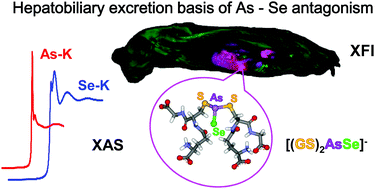Selenium-mediated arsenic excretion in mammals: a synchrotron-based study of whole-body distribution and tissue-specific chemistry†
Abstract
Arsenicosis, a syndrome caused by ingestion of arsenic contaminated drinking water, currently affects millions of people in South-East Asia and elsewhere. Previous animal studies revealed that the toxicity of arsenite essentially can be abolished if selenium is co-administered as selenite. Although subsequent studies have provided some insight into the biomolecular basis of this striking antagonism, many details of the biochemical pathways that ultimately result in the detoxification and excretion of arsenic using selenium supplements have yet to be thoroughly studied. To this end and in conjunction with the recent Phase III clinical trial “Selenium in the Treatment of Arsenic Toxicity and Cancers”, we have applied synchrotron X-ray techniques to elucidate the mechanisms of this arsenic–selenium antagonism at the tissue and organ levels using an animal model. X-ray fluorescence imaging (XFI) of cryo-dried whole-body sections of laboratory hamsters that had been injected with arsenite, selenite, or both chemical species, provided insight into the distribution of both metalloids 30 minutes after treatment. Co-treated animals showed strong co-localization of arsenic and selenium in the liver, gall bladder and small intestine. X-ray absorption spectroscopy (XAS) of freshly frozen organs of co-treated animals revealed the presence in liver tissues of the seleno bis-(S-glutathionyl) arsinium ion, which was rapidly excreted via bile into the intestinal tract. These results firmly support the previously postulated hepatobiliary excretion of the seleno bis-(S-glutathionyl) arsinium ion by providing the first data pertaining to organs of whole animals.



 Please wait while we load your content...
Please wait while we load your content...